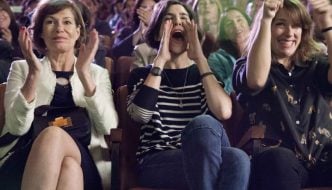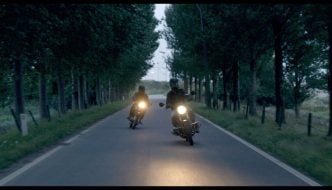[Image courtesy of rockfeedback.com]
Like many other 21st century music enthusiasts and budding musicians, there was a period in the early noughties where Gangsta Rap took precedent over guitars and gigging with turntables seemed like a more realistic goal than touring with a band. (Seriously, how many of your friends were still playing Dre’s album 2001 in 2002, when it actually came out in 1999?).
Wonderfully though, this all changed with a transatlantic swathe of Indie-rock bands so powerful that many of us decided to literally pull up our pants and pick up our plectrums again. At the forefront of this revival were The Strokes, who somehow managed to change the agenda in the birthplace of Hip-Hop, while simultaneously causing a bigger stir here in the U.K.
To put it simply, The Strokes – and particularly their debut album Is This It – means a great deal to many of us. So, when TSOTA got the opportunity to talk to Gordon Raphael (the man responsible for producing their first two albums, working with The Libertines, and signing Regina Spektor) we were all very excited.

On the line, from his current hometown Berlin, Gordon talked about all things music and his upcoming UK tour…
TSOTA: To start off with, what were some of your early musical highlights as a youth?
GR: As a young person, my father was a jazz musician. He played saxophone, so growing up I heard jazz played in my house a lot. I didn’t really like jazz, to be honest, because Rock ‘n’ Roll was something I was a lot more interested in. So, I was really influenced by Jimi Hendrix, The Beatles, and Frank Zappa.
I started playing piano by the age of 8, and I was in bands from the age of 13. Since I played keyboards, I really got into the British Progressive Rock movement with all those great musicians, who played synthesisers and had great keyboard sounds. I was living in Seattle at the time and there was a small but really supportive music scene then, even before the grunge scene. Especially because it rained so much, like England, there was plenty of time to rehearse and play music.
TSOTA: So, how did you get into production then?
GR: Around the time I was 18, I really wanted to write and record my own songs. So, I thought the best way to do that would be to learn to record. That way I could prevent anybody from having to watch me and I could improve as a songwriter. I guess I was always seemingly exposed to people who were domineering, who were letting me know that I wasn’t quite good enough, my timing wasn’t good enough, or my ideas weren’t good enough. So, I figured I could really break through if I didn’t have anybody really on my ass, or breathing down my neck, while I was experimenting.
TSOTA: With that being your starting point, which side of the mixing desk do you prefer to be on?
GR: I initially never thought I would have the patience or desire to listen to or want to record other bands. It came about as a necessity – around 1998, when I was just about running out of money from the only signed band I was ever in. I was almost penniless, in New York, when a band asked me to record them. To my surprise I really enjoyed it, they told their friends and in a matter of weeks I was working almost every day recording. That period was really a paid education for me, because I learned so much about recording, mixing, song writing and structuring music. I was also enjoying surviving and making money in New York.
So, to get back to the question, I enjoy being on both sides of the mixing desk. For the past ten years it’s been really intensively in favour of the production side. But now, over the past two years, I’ve had more chance to play more live shows – especially in Mexico, Argentina, and Brazil. I just love how liberating the live show is. To not have the opportunity to erase something, or edit it, and just get up in front of people creates a lot of energy.

[Image courtesy of gopixpic.com]
TSOTA: How would you describe the music scene you’ve experienced in South America?
GR: Well, let’s talk mostly about Argentina. I would have to say that Buenos Aires is the most Rock ‘n’ Roll-centric city in the world right now. As far as being in a band with electric guitars is in fashion, highly respectable, and actually a strong part of the culture. They have a long history, over the past twenty years, of political oppression – almost like the 60s in the US and in Britain. So, they have their own John Lennons and their own Jimi Hendrixs, with their own histories and personalities.
I actually ended up there because The Strokes did a huge show in 2011. I’m not sure if the band didn’t really breakthrough in 2001, but it seemed like Strokesmania really took off in Argentina ten years later than it did anywhere else. Suddenly, I had 3000 Argentinian Facebook friends – all with the surnames: Casablancas, Moretti, Fraiture, and Valensi!
TSOTA: It’s amazing that music can resonate in so many different places so long after it was recorded. What experiences have you had with people reacting to music you worked on after it was released?
GR: Right after Is This It and Room On Fire, especially in England, people came up to me and said: “I always hated Rock music, because it was what my older brother used to listen to. But when The Strokes came out I put down my DJ set, picked up a guitar, and joined a band – thanks a lot.” They were definitely some of the cooler compliments that I got quite frequently.
TSOTA: Did you feel that those records would have that impact at the time, or was it a surprise to you?
GR: The first thing I ever recorded with The Strokes was the EP The Modern Age, which just felt like a bunch of kids coming up to me to ask if I could record a demo so that they could get shows. At that point I thought it was curious that these guys had a reference to the sound of Velvet Underground, or The Stooges. I thought, ‘that’s from my generation. How do 19 and 20 year old kids from this generation hear that, when nothing in their culture is referencing it?’ My second thought was: ‘these poor guys! Don’t they know that nobody in New York likes guitar music anymore? Even if they’re good, nobody’s going to listen to this music.’ So, I was completely surprised when they started catching on – first in the UK, then in the US.
Similar to musicians like Jimi Hendrix though, somebody from London – namely James Endicott and Geoff Travis – listened to this little demo we made. Then there was such a furore coming from England that the US Media had to write about it. They didn’t want to write about it, and the record labels didn’t want to have to sign a band like that –it was the furthest thing from their minds. But, because of the noise coming from England, nobody could deny it. The limos were parked around the block when they came back from their first UK tour, with a frenzy of people wanting to sign them and cover them. I’m positive that was because of NME, Rough Trade, and the reaction of the UK public.

[Image courtesy of the BBC]
TSOTA: What would you say were your fondest memories of that period?
GR: Well, imagine going on the first UK tour with The Libertines. They, initially, opened up for The Strokes on their tour, at Leeds University I believe. I got to introduce the two bands together back-stage. Then, at the after-show party The White Stripes were there. That was a pretty big high, at that moment right around the beginning of my time in the UK.
Then I started a club night, in 2003, with Toby L from Transgressive records. We had Bloc Party, The Libertines, and Regina Spektor play there. I also got my own record label as well, through Sony, called Shoplifter Records, and signed Regina Spektor as our first artist.
TSOTA: Did it feel like success after success at that point?
GR: I had a good dose of the down spiral early on too. Even though The Libertines asked me to produce them and I was working towards that, at some point before the first single they announced to me that somebody had said they couldn’t work with me. I never got the reasoning for that. We’d been hanging out every day for months and I was on tour with them, as their live sound engineer. Suddenly that happened and I didn’t see them much after. So, what I thought was going to be my next really big step didn’t turn out well. That really saddened me and was quite a shock at the time.
TSOTA: Jumping back to the present, tell us about your coming UK tour. What we can expect from you when you arrive?
GR: For the past few years, I’ve been invited by different recording colleges and music schools – in places like Bristol, Mexico City, and Buenos Aires – to talk to young musicians and young producers about my career, my views on the music industry, and to answer various questions. There seems to be something in my career and in my stories that is able to connect with an audience. So, a friend of mine from Leeds, Nicholas Ellis, said that there are enough music fans interested in my records that this could work as a tour. So, I’m coming to tell stories and answer people’s questions in four cities in the UK (London, Leeds, Manchester, and Wakefield).
The questions I’ll be addressing will range from: how should I pick what microphones I should use? To, what was it like working with Julian Casablancas? To, what do you do if two people in the same band disagree with something when you’re recording? It’s kind of an experiment to be honest.
Throughout the course of the conversation Gordon enlightened us to a whole host of other stories about his fascinating career. Not only is it intriguing to hear these stories first hand, it is amazing to get a slightly different insight into the mechanics of what shaped such a powerful creative period – on both sides of the Atlantic.
With a plethora of other stories to unfurl on his audience, alongside a great ability to respond to questions in an agile way, Gordon’s upcoming UK tour will no doubt be a completely unique insight into a world that so many of us are still addicted to.
Sinclair Belle
You can catch the GordoTronic UK Tour in the following cities:
Manchester – January 29th 2015 — Day & Night
Wakefield – January 30th 2015 –Unity Works
London – February 5th 2015 –Dingwalls
Leeds – February 8th 2015 —Eiger Studios: TICKETS HERE
For more info visit Gordon’s website www.gordotronic.com or follow him on Twitter @Gordonraphael




Comments